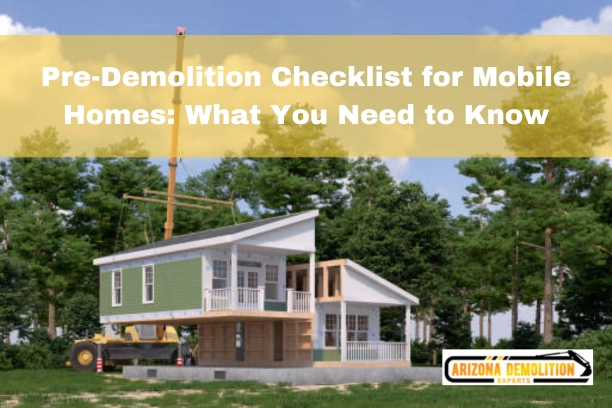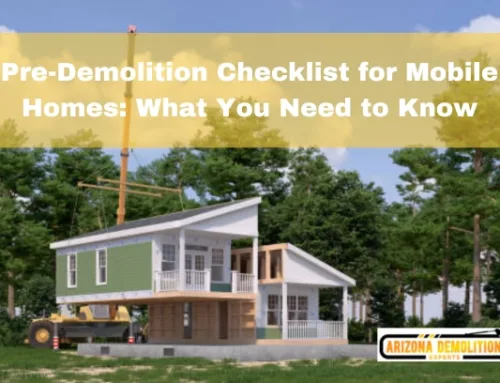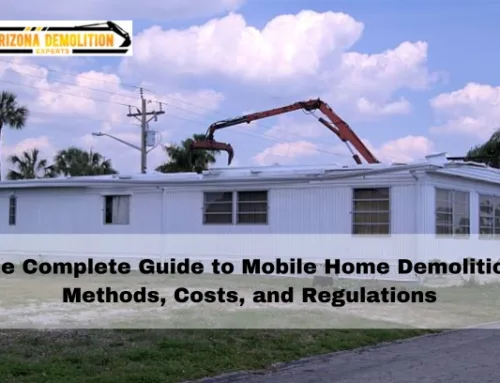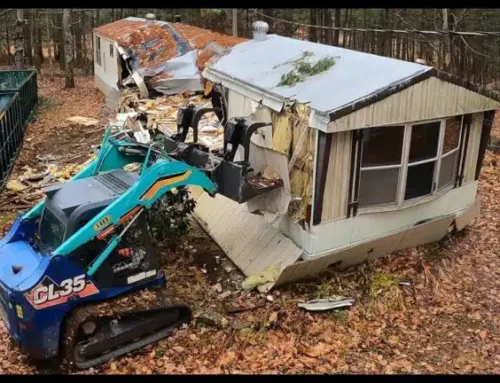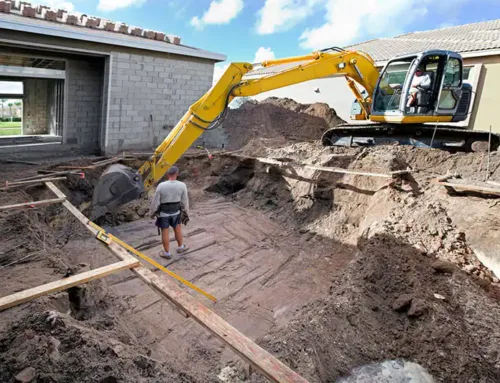When the time comes to dismantle a mobile home, understanding the ins and outs of the process is crucial. Unlike traditional house demolition, mobile home demolition presents unique challenges that demand careful planning and consideration. This is where a comprehensive pre-demolition checklist becomes your indispensable tool. It ensures a smooth and efficient process and helps mitigate potential risks associated with the demolition of mobile homes. Every step requires meticulous attention to detail, from navigating the intricate web of regulations to handling the physical dismantling.
In this guide, we’ll walk you through the essential steps and considerations to prepare for mobile home demolition, ensuring you have all the necessary information at your fingertips. Whether you’re a homeowner looking to clear a plot for new construction or a demolition contractor specializing in residential demolition, this checklist will provide you with the insights to navigate the process confidently.
Preparing for Takeoff: The Initial Steps
Inventory Assessment: Cataloguing What’s Inside and What Needs to Go
Before a demolition contractor can begin the work on your mobile home, conducting a thorough inventory assessment is important. This step is crucial for multiple reasons:
- Identifying Valuables and Salvageables: Determine which items can be saved, sold, or donated before the house demolition begins.
- Hazardous Materials: Spotting any materials that require special handling, such as asbestos or lead, which are common in older mobile homes.
- Waste Management: Estimating the volume and type of waste the demolition will generate, allowing for proper disposal planning.
Creating a detailed inventory helps in reducing waste, saving on disposal costs, and ensuring that hazardous materials are appropriately managed, making this step a critical part of the pre-demolition process for any mobile home.
Documentation and Permissions: Navigating the Paperwork and Legal Necessities
The demolition of mobile homes, like any residential demolition, is bound by a framework of legal requirements that must be carefully navigated. Here’s what you need to know:
- Demolition Permits: Most local authorities require a permit for mobile home demolition. The application process may vary, so it’s essential to contact your local building department for specific requirements.
- Utility Disconnections: Before demolition can commence, all utilities must be safely disconnected. This includes electricity, gas, water, and sewer services. Coordination with utility companies is a must.
- Notification of Neighbors: Informing your neighbors about the upcoming residential demolition is not just a courtesy but often a requirement, especially if it might affect their property or daily routine.
Taking these initial steps seriously sets the foundation for a successful and hassle-free mobile home demolition. It ensures that all legal and safety measures are in place before proceeding with the actual demolition process.
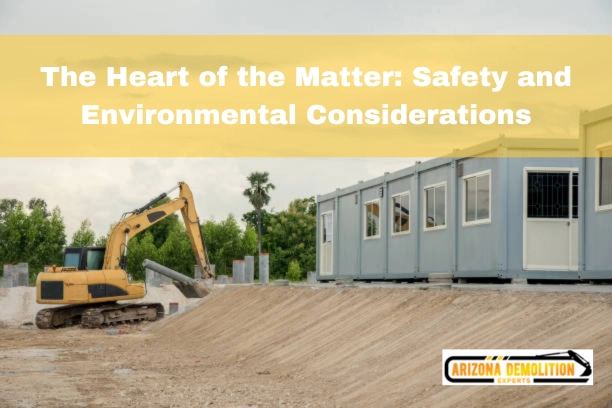
The Heart of the Matter: Safety and Environmental Considerations
Ensuring the safety and protection of the environment is paramount during the demolition of mobile homes. This phase demands meticulous planning and adherence to regulations to mitigate any potential harm.
Conducting a Hazardous Materials Survey
Asbestos Detection and Removal
- Survey: A professional survey to identify asbestos-containing materials.
- Containment: Secure and contain areas where asbestos is present.
- Professional Removal: Engage licensed professionals to safely remove and dispose of asbestos.
Lead-Based Paint and Other Toxins
- Identification: Inspection for lead-based paint and other hazardous substances.
- Safe Handling: Implementing lead-safe practices for removal and disposal.
Preserving Wildlife and Natural Habitats
- Environmental Assessment: A thorough examination of the demolition site for potential impacts on local wildlife and ecosystems.
- Protective Measures:
- Relocation of affected fauna.
- Scheduling demolition outside sensitive breeding or nesting periods.
- Restoration Plans: Strategies for post-demolition land restoration to support local biodiversity.
Community and Communication: Keeping Everyone in the Loop
Effective communication forms the backbone of a successful and conflict-free mobile home demolition project, fostering positive relations with the community and ensuring compliance with regulations.
Implementing Neighborly Notices
- Advance Notification: Informing neighbors well in advance about the demolition timeline.
- Details of Demolition: Providing specifics on noise levels, expected traffic, and safety measures in place.
- Open Line of Communication: Offering contact information for concerns or questions.
Seamless Coordination with Utility Companies
- Checklist for Utility Disconnections:
-
- Electric
- Gas
- Water
- Sewer
- Safety Protocols: Ensuring all disconnections are performed safely and in accordance with local regulations.
- Verification: Double-check that all services are fully disconnected before proceeding.
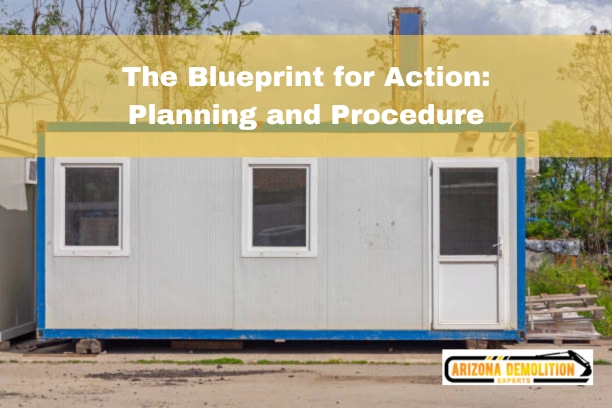
The Blueprint for Action: Planning and Procedure
Planning the mobile home demolition involves selecting the appropriate strategy and preparing the site to ensure the process is smooth, efficient, and minimizes risks.
Selecting the Appropriate Demolition Method
Mechanical Demolition
- Pros: Fast and cost-effective.
- Cons: Higher debris and waste.
Deconstruction:
- Pros: Allows for material recovery and recycling.
- Cons: More time-consuming and potentially costlier.
Hybrid Approach
Combining both methods to balance efficiency and environmental considerations.
Preparing the Site and Ensuring Access
Securing the Demolition Area:
- Erecting safety barriers.
- Signposting to warn of demolition work.
Access Routes:
- Clearing access for demolition equipment.
- Designating areas for debris collection and disposal.
Dust and Debris Management:
- Implementing dust control measures.
- Planning for efficient debris removal.
By incorporating these detailed steps and considerations into the pre-demolition process, stakeholders can ensure that the mobile home demolition is conducted safely, responsibly, and with minimal environmental impact. Engaging with the community and ensuring clear communication further supports a smooth operation, while careful planning and the choice of demolition method can significantly affect the project’s overall success and sustainability.
Execution with Precision: The Mobile Home Demolition Process
The execution phase is where planning meets action. A well-executed demolition ensures safety and efficiency, minimizing unexpected challenges.
Tearing Down Safely: Step-by-step Guide on the Demolition Day
- Final Walk-through: Conduct a last inspection to ensure the site is ready and all safety measures are in place.
- Demolition Sequence: Start the mobile home demolition from the top down, section by section, to control the fall of materials and minimize hazards.
- Monitoring: Continuously monitor the process to adjust the plan as necessary, ensuring the safety of the crew and the public.
Debris Management and Recycling: Sorting and Disposing of Materials Responsibly
- Sorting on Site: Separate materials into categories—metals, woods, and non-recyclables—for easier recycling and disposal.
- Responsible Disposal: Ensure hazardous materials are disposed of according to local and federal regulations.
- Recycling: Maximize the amount of materials sent to recycling facilities to reduce landfill waste.
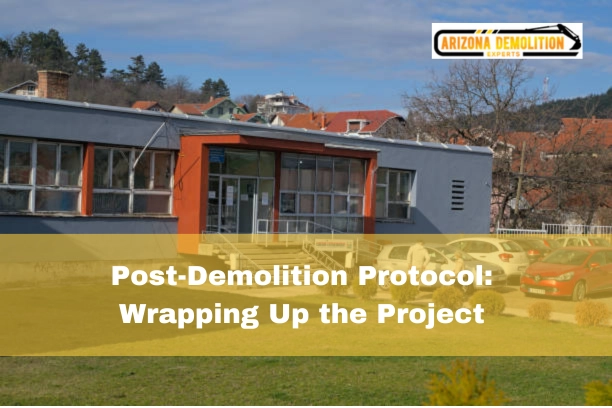
Post-Demolition Protocol: Wrapping Up the Project
After the physical mobile home demolition, attention turns to site clean-up and restoration, ensuring the site is prepared for its next use.
Site Clean-up and Restoration: Ensuring the Land is Left in a Better State
- Debris Removal: Clear all demolition debris, leaving the site clean.
- Soil Testing: Conduct soil tests to assess if any remediation is required.
- Landscaping: Implement landscaping or restoration plans to prevent erosion and support local ecology.
Final Inspections and Paperwork: Confirming All Tasks are Completed to Standard
- Inspection by Authorities: Have the local building or environmental authorities inspect the site to meet all demolition and clean-up standards.
- Completion Documentation: Collect and file all necessary documentation, including permits, inspection reports, and disposal receipts, for future reference.
Conclusion: The Pillars of Successful Mobile Home Demolition
Reflecting on the pre-demolition checklist for mobile homes, it’s clear that thorough preparation and meticulous planning are the bedrock of a successful demolition project. From the initial steps of inventory assessment and securing the necessary permissions through the careful consideration of safety and environmental impacts to the execution and final clean-up, each phase plays a pivotal role in achieving a smooth and efficient demolition process.
This guide underscores the importance of:
- Safety and Compliance: Adhering to all safety guidelines and legal requirements.
- Environmental Responsibility: Minimizing the environmental impact through careful hazardous material handling and maximizing recycling opportunities.
- Community Engagement: Keeping the community informed and involved, ensuring the demolition process is as unobtrusive as possible.
By embracing these principles, those involved in mobile home demolition can ensure the project’s success, paving the way for new developments while respecting the community and the environment.
This comprehensive approach to mobile home demolition, emphasizing precision, safety, and responsibility, facilitates successful project completion and contributes positively to the broader community and environmental goals.
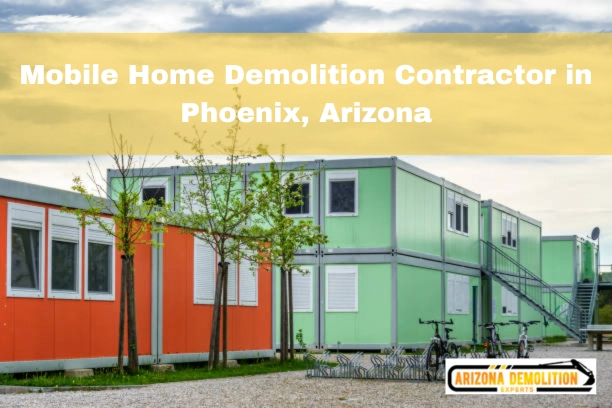
Mobile Home Demolition Contractor in Phoenix, Arizona
At Arizona Demolition Experts, your mobile home demolition project in Phoenix is in the hands of professionals prioritizing safety, efficiency, and environmental stewardship. With a comprehensive approach that mirrors the crucial steps of a successful demolition project, we ensure that every phase, from pre-demolition planning to post-demolition clean-up, is executed flawlessly. Our team is skilled in navigating the unique challenges of mobile home demolition, ensuring compliance with all regulations, and minimizing impact on the environment and community. Choose Arizona Demolition Experts for a seamless, responsible demolition experience that sets the stage for your next venture. We are the leading demolition contractor in Phoenix and the surrounding areas; contact us today at (480) 674-8348 for expert guidance and service.
Read more
